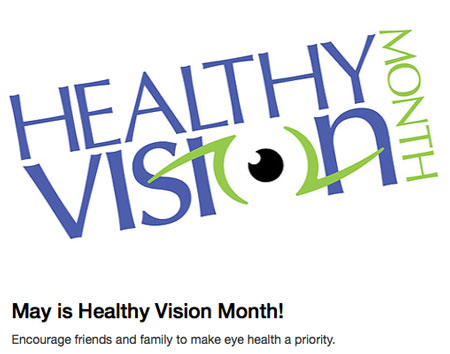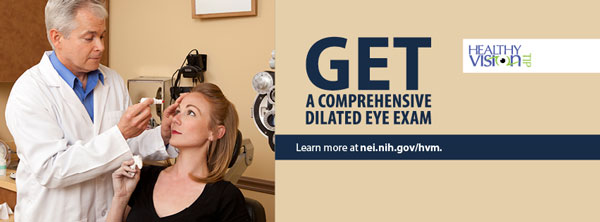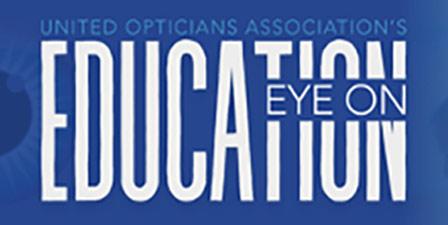May is Healthy Vision Month, a national eye health observance established in May 2003 by the National Eye Institute. NEI is an agency of the U.S. Department of Health and Human Services.

Millions of people in the United States have undiagnosed eye diseases and vision problems. This is a month to help educate your community on the importance of a routine comprehensive dilated exam to maintain eye health and preserve vision. A dilated eye exam is the only way to catch many eye diseases, because there are no warning signs. Surprisingly many patients don’t even realize their visual acuity can easily be improved with glasses or contacts.
The National Eye Institute website does an excellent job of explaining the need for healthy lifestyles because living healthy can lower the risk of eye disease.
Being overweight or obese increases your risk of developing diabetes and other systemic diseases, which in turn can lead to vision loss. These diseases include diabetic retinopathy and glaucoma. Eating healthy foods high in omega 3 fatty acids, such as tuna and salmon can help with eye health. Dark green leafy vegetables such as kale and spinach are good also.
Exercise improves circulation and improved circulation leads to increased blood flow. Good blood flow is vital for good eye health. Don’t smoke. Smoking is bad for your eyes and the rest of your body. It can increase the risk of developing macular degeneration and cataracts.
Eating healthy, including a diet rich in vegetables and fruits is vital for eye health. Managing your overall health is important also. If you have been diagnosed with any systemic disease, make sure to follow your doctor’s plan of action.
Knowing your family medical history is vital. It is important to know if any of your family members have been diagnosed with any eye diseases, since many are hereditary. This makes you a higher risk of developing the diseases yourself.
Wear safety glasses. Even those around the house chores can lead to traumatic eye injuries. About 2,000 U.S. workers have job related eye injuries that require medical treatment each day. Household chores, such as cleaning with abrasive detergents and bleach can easily cause eye injuries just from being splashed into the face and eyes.
For the athletes, wear those safety sports glasses. Baseballs and tennis balls can easily cause a retinal detachment if hitting the eye with enough force.
Get those shades out. Sunglasses help protect the eyes from damaging sun rays. Harmful or excessive sunlight exposure can cause cataracts, macular degeneration, and pterygiums. Make sure any sunglasses purchased have been approved to block 99 to 100% of both UVA and UVB rays. A wide brimmed hat can help also.

National Eye Institutes Healthy Vision Month can open the door to patient education. Having pamphlets with different eye problems to give to patients is important. I like to make bags with macular degeneration information, AREDS 2 vitamin samples, and a few Amsler Grids to give out. I keep diabetic magazines in the magazine racks to allow people to become more educated about the disease, and they include recipes that can help with blood sugar issues. As a rule, we always recall our patients at least yearly if not sooner if they are diabetic to remind them it is time for a complete diabetic exam.
Go to the National Eye Institutes web page at www.nei.nih.gov for information and a toolkit including a Healthy Vision Fact Sheet, Website buttons, infographics to print and share. There is also an article you can print or send to a local newsletter or newspaper. Patients enjoy celebrations. Create a celebration and use the opportunity to educate your patients on all the ways to prevent eye diseases and permanent visual loss, not just in the month of May, but year round.

Linda Hardy received the American Optometric Association Paraoptometric of the Year Award at the 2016 SECO meeting in Atlanta, Georgia. Linda is a Certified Optometric Technician (COT) and Certified Ophthalmic Assistant (COA). She is also ABO and NCLE certified and a Licensed Dispensing Optician (LDO) in the state of Georgia.
A graduate of Georgia Medical Institute as a Registered/ Certified Medical Assistant, Linda began her optical career working with a group of ophthalmologists as an ophthalmic assistant. She has been the Clinical Coordinator with a private optometry practice in Newnan, Georgia for 15 years.
Linda is also a speaker and educator at regional optical meetings. She and her husband have five children, and she enjoys spending time with her family, exercising, reading and volunteering in her community.












